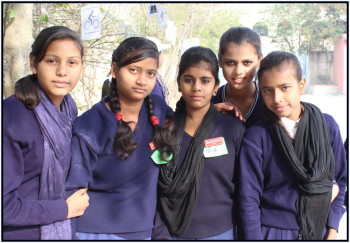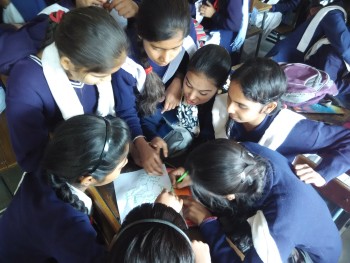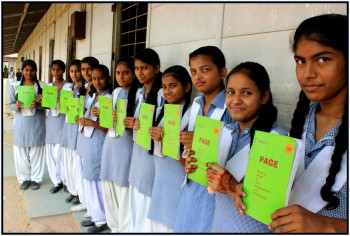
Examining the Potential of Delhi’s Girls
30 March 2016
Media Contact
It is 8:30 a.m. on a hot summer morning and I am frantically trying to locate the classroom I have come to observe. I have been to this school dozens of times, and yet every time it looks different. Shuffling through the corridors as I make my way up to the classroom, carefully avoiding a noisy bunch of girls running down the stairs, I am excited for what I am about to see.
I reach my destination and about forty, seventeen year-old girls rise to wish me good morning and settle down as I walk to the back of the room, hoping to sit quietly while I observe the class. The girls move their attention to the blackboard as their trainer, Shabana, conducts a classroom-based session on positive communication illustrating the feedback loop, which ensures a message is properly received and interpreted by the other party, to the girls. Coming to observe sessions like this one is one of the best part of my job.
 As the session progresses, one of the teachers walks in and reacts, “Oh! The Magic Bus class is on! These days every time you walk by a quieter classroom, you know that the Magic Bus class is on! Even during their regular class period, students cannot stop talking about these classes!”
As the session progresses, one of the teachers walks in and reacts, “Oh! The Magic Bus class is on! These days every time you walk by a quieter classroom, you know that the Magic Bus class is on! Even during their regular class period, students cannot stop talking about these classes!”
This is a common occurrence at the four Government Girls’ Senior Secondary Schools in Delhi where ICRW is implementing the Planning Ahead for Girls’ Empowerment and Employability (PAGE) program. The program works with girls who are 15 to 17 years-old in 9th and 11th grades. The students and teachers identify the sessions conducted under the program as ‘Magic Bus classes’ as the trainers for these sessions come from the Magic Bus India Foundation, which ICRW has partnered with to implement the program. The PAGE trainers are a group of young, talented individuals who form the backbone of the PAGE project team. In partnership with Magic Bus, ICRW has conceptualized and implemented the PAGE program with the objective of empowering girls and providing them with employability skills that will prepare them for life after school, where they are able to make their own decisions about their future, especially if their future involves work.
 For the girls in the PAGE program, this may be a tall order, as the girls come from vulnerable socio-economic backgrounds with very strongly restrictive gender norms.
For the girls in the PAGE program, this may be a tall order, as the girls come from vulnerable socio-economic backgrounds with very strongly restrictive gender norms.
A formative research study, conducted to inform the design of the PAGE program, showed that girls are very self-aware of what they can or cannot do in their daily lives, but often have little understanding of why their society, family or community has different expectations and restrictions for them as opposed to their male counterparts, such as their brothers or boys in the community.
In the PAGE curriculum, the first module, entitled “Self”, encouraged girls to think and talk about what factors shape their identity and how concepts of power, patriarchy and gender norms have a significant bearing on the way they see themselves along with how the world sees them. And while it is important for girls to be able to deconstruct their identity by understanding the factors that influence and impact their lives, it is equally important that they are able to reflect and develop a clearer and stronger sense of self that is more confident and self-assured. These are the building blocks that allow girls to think about, make and communicate their own decisions with respect to their futures. If that future involves the will to work, then they should know how and where to find the tools for their job.
 This is where the second module on ‘Self-efficacy’ comes in. In order to build confidence and self-assurance around their identities, girls are taken through sessions on communication, problem solving, goal setting and developing leadership traits.
This is where the second module on ‘Self-efficacy’ comes in. In order to build confidence and self-assurance around their identities, girls are taken through sessions on communication, problem solving, goal setting and developing leadership traits.
During my school visits, I often speak with girls to gauge their perceptions about the program. In discussing the second module, a 10th grade girl said: “The Self-Efficacy module taught me that the qualities I admire in other people, I can develop, too. For me that was a big realization. I don’t always have to look to others to be leaders. I can also demonstrate personal leadership”.
Another eager 10th grade student explained to me: “When I was growing up, I wanted to be a teacher like society expects us to be…because it is safe. Then, I thought I would be a doctor, because my father said that would be a good profession… but when we learned about gendered roles and expectations and goal setting in PAGE, I realized that I want to be a NASA scientist. That is what I will work towards. Not what the society wants or what my family wants, but what I want.”
Listening to girls talk about PAGE and detail what they’ve learned from the program strengthens my belief that what we are doing in PAGE is vital and can have a positive effect on the lives of these girls. In order to ensure that girls have an enabling environment to support their learning form the program, PAGE also engages with girls’ parents and teachers through different platforms. Some of the teachers have told ICRW that girls are more focused now, while some parents have expressed that their daughters are becoming more articulate and confident by participating in the program.
However, working with adolescent girls comes with challenges. As one of our trainers put it, “Working on this project has been a big learning curve for me. When I started taking the sessions, the 11th grade girls would seem disinterested. They had this feeling that now we are grown up and do not need to sit through sessions that aren’t a part of our school curriculum. However, as most of the PAGE curriculum is transacted through activities, it makes it easier to capture girls’ attention. They love group work and I never have a dearth of volunteers for an activity. Also, once we started the sessions, the girls had a lot to say!”
 As I walk out of the classroom, I see a group of girls huddle towards their trainers, excitedly talking over each other, eager to ask their own questions. It is one thing to observe them during a PAGE session in the classroom, but completely another to be able to catch a glimpse of these young bright girls confidently asking questions and asserting their point of view.
As I walk out of the classroom, I see a group of girls huddle towards their trainers, excitedly talking over each other, eager to ask their own questions. It is one thing to observe them during a PAGE session in the classroom, but completely another to be able to catch a glimpse of these young bright girls confidently asking questions and asserting their point of view.
I smile and make my way to the next session as I think about the potential of each girl in each of these schools, eager to see how they use their new-found confidence to decide for themselves what their future entails.
Planning Ahead for Girls’ Empowerment and Employability (PAGE) is a pilot action research intervention, funded by the MacArthur Foundation, to create a sustainable, replicable, school-based model for adolescent girls from low-income communities in grades 9 and 11. The PAGE project is being implemented in collaboration with the Magic Bus Foundation, over a two-year period in government schools in South and East Delhi. The program will be conducted in these schools until April 2016 (the end of session, before the summer vacation).
